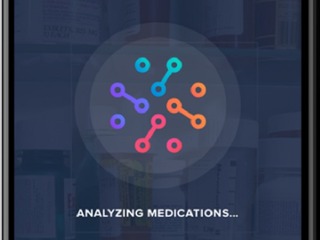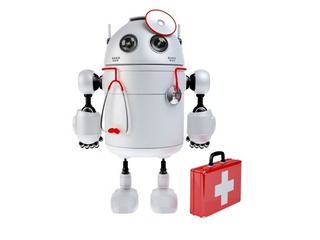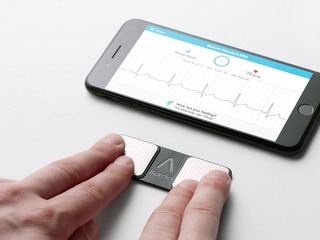MyFitnessPal launches support tools for patients on GLP-1 meds
The tools include content such as educational videos, recipes, and daily nutrition tips
Read more...
The use of AI in healthcare has been on the rise. In 2012, there were only 20 companies in the AI healthcare space that raised funds; by 2016, the number had more than tripled to 70, according to data from CB Insights. Chatbots in particular are already having a major impact: cost savings this year are projected to be $2.8 million, and are expected to rise to $3.6 billion in 2020.
Chatbots are such cost savers because they are able to not only give patients information that can save them a costly trip to the doctor, while also saving the provider time and money by asking preliminary questions that allow them to get to the heart of the problem quicker.
One company providing such a service is Ada Health, an AI-driven personal health companion and telemedicine app. Earlier this week, Ada announced that it raised a €40 million ($47 million) funding round led by Access Industries. June Fund, Cumberland VC and William Tunstall-Pedoe, the AI entrepreneur behind Amazon Alexa, also participated in this round, as did Ada's existing investors.
Ada had previously raised around €20 million over a six and a half year period. This is Ada’s first institutional round of investment.
"We've really taken a somewhat unusual approach. We have a team of now roughly 100 people, we've been working on the technology, on the medical knowledge base, on the reasoning engine, the AI, for a long time because, while I'm a big believer in general in minimum viable product and iterating, I think in healthcare it's different," Daniel Nathrath, CEO and co-founder of Ada Health, explained to me.
"You can't go out in healthcare and say, 'It's totally inaccurate but we're just going to put it out there because it's a minimum viable product.' You can't really do that because you're touching people’s lives, and you have to be responsible. So we put a lot of effort into it."
After having first been available for specialists, and then general practitioners, Ada finally feels like the product is good enough to be available for patients.
"We feel that this is the right time to scale up and grow," said Nathrath.
"Like a WhatApp chat with a trusted doctor"
Launched in 2016, the Berlin-based Ada acts as a digital doctor, asking relevant, personalized questions based on the information provided and then suggesting possible causes for symptoms, allowing users to make informed decisions about their health.
"Around nine out of 10 people Google themselves before themselves they go to the doctor. I think that pretty clearly shows a certain need. Often the first question they would ask a doctor is if they need a doctor. We are at the start of the patient’s journey through the healthcare system and we can help people find out what's wrong with them and we can help them understand and manage their health better," said Nathrath.
Using Ada, he told me, "is like a WhatsApp chat with a trusted doctor," as it is able to have a conversation with a patient about their symptoms and potential treatments. Ada uses AI to calculate questions based all of the bits of information it receives.
At the end of the chat, when Ada has sufficient information, it will then give the user suggestions on what might be causing their health problems, showing them, based on probability, the most likely options of what it might be, along with more explanation on which symptoms indicate which problem they may have. The app will also make suggestions on what steps to take next, whether that be to buy over the counter medicine, go see a doctor or go to the emergency room, all depending on the severity of the problem.
"Ada does two things: it triages you, which means it gives you a good idea of what to do next, but it also gives you diagnostic suggestions. We don't call it a diagnosis because, legally, only a licensed doctor is allowed to make a diagnosis, but it's diagnostic suggestions," Nathrath explained.
"We assume the outcomes with a very high probability. If it's just a common cold, Ada then logically wouldn't suggest you go to the emergency room. It would say that if things get worse to consult a doctor, but, based on the information you provided, nine out of 10 people who reported the same symptoms actually just have common cold and here are some options for what you could be doing."
Ada has already begun partnering with providers in the United Kingdom so that it can help patients go even further on their healthcare journey, consulting with their doctor, whether that means setting up a telemedicine session or a house call.
Coming to America
Ada plans to offer something similar in the United States in the next few months and, to make that happen, it is spending part of this new funding on opening its first office in the United States.
While the company is not yet set on which area of the country it plans to locate, right now Nathrath says it is "leaning toward New York."
"It depends a little bit on if we the perfect candidate to head the office, but they would want to be in the Valley or San Francisco or want to be in Boston, we might be flexible. It's just that, from Germany or London, it's a much shorter flight and there's less of a time difference and a lot of our potential partners are based on the East Coast," he said.
"The U.S. market is obviously a very important healthcare market in the world, and we’re all big admirers of everything that comes out of the U.S. but, I'm sure, like in most countries, the healthcare system could be, to put it politely, even more efficient for the benefit of the patient. So, we see a lot of potential there to improve the patient's care journey, and, at the same time, to reduce cost. Logically, if you're not diagnosed or misdiagnosed and, therefore, you go down the wrong path and you possibly take an expensive MRI that wouldn't really be necessary, it generates a lot of cost in the system that isn't necessary. If you can catch a $10 problem before it becomes a $10,000 problem, this in itself has a lot of value to the system."
The company will also use the funding to grow its team with more engineers, scientists and medical advisers, doubling its headcount in the next 12 to 18 months. On top of that, it will continue to expand the product, including adding more languages beyond English and German, such as Spanish and Portugese, as well as launching a voice activated version of Ada.
"We already have an experimental voice version out there. It's kind of a natural progression, obviously, if you have a conversational interface anyway. It's a request that we get from out users quite often. The scientist behind the artificial intelligence that powers Amazon Alexa also invested in this round, and is continuing to support us on an ongoing basis as an advisor, so it's only a matter of time before we publicly make a voice controlled interface available," said Nathrath.
He also has plans to Ada from being reactive to proactive. That means gleaming data from a variety of sources, such as wearable devices, and using that to monitor a patient's health for potential warning signs. The app has already integrated with Apple HealthKit.
"Just to give you an example, if you had a blood pressure monitor that's connected to your iPhone via Bluetooth, then Ada wouldn't ask you if you recently had high blood pressure, since Ada has the actual data. One important thing to know about Ada is that it's not just a symptom checker, but it's a system that can take into account any data source that is relevant for making the right diagnostic suggestions to the patient. This could be any kind of sensor data," said Nathrath.
"There are very interesting devices out there where you can feed data into your phone, and this is good data because it's not patient provided, but it's hard data and that's even better than if the patient tells you. A lot of that data can be collected passively and that way Ada can, over time, by integrating more of those data sources, be more proactive and warn people before something becomes serious or even life threatening."
The future of AI in healthcare
Since its launch in late 2016, over 1.5 million people have used Ada to help them assess their health and it's actually able to more accurately diagnose patients than an individual family doctor, partially due to the ability check for many rare diseases that a typical doctor would almost never come across, and wouldn't think to look for.
However, Nathrath does not see Ada as a replacement for doctors, but rather as a tool to help them get better results.
"Systems are coming up that are, in some areas, as good or better compared to human doctors. For example, image recognition is an area where machines are superior to humans, and there are other areas where humans are superior to machines. For me it's not an either/or," he said.
"Our approach is that there's a lot of work that has to be done to really incorporate the best human knowledge. We have done a lot of manual work to build a very extensive expert knowledge base and then, on top of that, we're now collecting a lot of data to refine that model for the benefit of the patient. Some of the promise of AI is still unfilled, but it's already quite evident that if you have a situation where a doctor uses the right system, the doctor will be able to do a better job than without the system."
AI is getting so good, in fact, that Nathrath sees a future where doctors will legally have to use them for the benefit of the patient.
"From our point of view, it's not about replacing the doctor, it;s about getting to the best outcome for the patient and, eventually, if it's statistically proven that if a doctor doesn't use certain systems they won't get to the best outcome for the patient. Then you get to a moral dilemma, and possibly even, at some point, a legal dilemma, where you have to say, 'Is it negligent if a doctor doesn't use these systems?' I think we're not far from that point."
The tools include content such as educational videos, recipes, and daily nutrition tips
Read more...Advances in technology, like in vitro and microfluidics, have helped advance research
Read more...Robots are taking over the heavy lifting work inside warehouses
Read more...



